This website uses cookies so that we can provide you with the best user experience possible. Cookie information is stored in your browser and performs functions such as recognising you when you return to our website and helping our team to understand which sections of the website you find most interesting and useful.
Vance Center Participates in IACHR Hearings on Judicial Independence and Mexico’s Judicial Reform
November 2024The Institutional Integrity Program participated in two timely hearings during the Inter-American Commission on Human Rights 191st Period of Sessions, held on November 12 and 13 in Washington, DC.
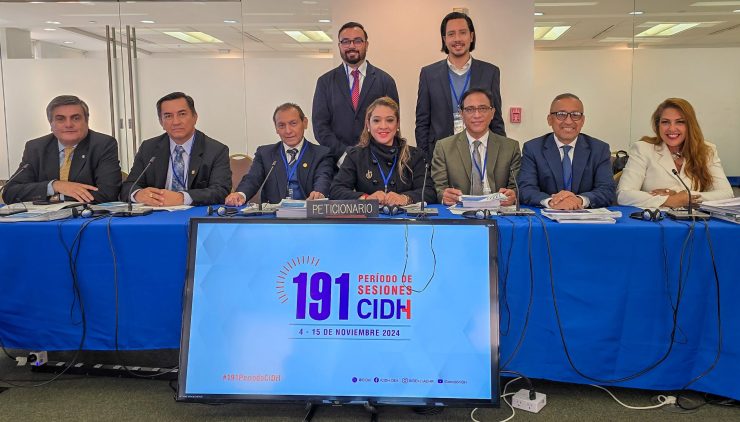
Vance Center staff and representatives of judges’ associations at the hearing, November 13, 2024, in Washington, DC. Photo credit: Vance Center
Associate Executive Director Jaime Chávez Alor and Program Advisor Cuitlahuac Castillo Camarena joined representatives of judicial associations, regional groups and international organizations to present on two priority issues: threats to judicial independence in Latin America and the recent overhaul of Mexico’s judiciary.
Mexican Judicial Reform
The first hearing, on November 12, brought together representatives from civil society organizations, federal judges, judicial associations, and international legal experts to discuss the recent reform and raise concerns about its potential implications for human rights and the rule of law.
The Vance Center joined prominent national organizations including the Asociación Mexicana de Mujeres Juezas y Magistradas (AMMJUM), Fundación para el Debido Proceso (DPLF), Asociación Nacional de Magistrados de Circuito y Jueces de Distrito del Poder Judicial de la Federación (JUFED), Derechos Humanos y Litigio Estratégico Mexicano (DLM), and Fundación para la Justicia y el Estado Democrático de Derecho (FJEDD), alongside Mexican federal judges and other legal practitioners presenting their concerns before the Commission.
The petitioners outlined some of the most urgent impacts of the reforms on different sectors of the population. Civil society organizations raised objections about holding popular elections for judges, noting that this mechanism does not ensure the selection of qualified candidates and compromises judicial independence. Representatives of judicial associations warned that the reform’s provisions that undermine the guarantee of judicial tenure and labor rights would have a disproportionate impact on women judges and magistrates. Advocacy groups stressed the detrimental effects for victims of serious human rights violations, who rely on an independent judiciary to seek redress. The petitioners also warned that the reform will consolidate political power by reducing judicial autonomy and increasing legislative and executive control over the judiciary.
Representatives of the Mexican State defended the reform, asserting that it adhered to constitutional procedures, incorporated citizen participation, and respected the labor rights of terminated personnel. The State claimed the reform reflects the sovereign will of the people, is beyond judicial review, and includes mechanisms to ensure the selection of qualified candidates through selection committees.
The IACHR Commissioners requested clarification from the Mexican state on the diagnostic basis for the reform, the exclusion of the Prosecutor’s Office from the reform model, and safeguards to prevent the involvement of organized crime in judicial elections. They also asked about measures to incentivize qualified candidates to pursue judicial careers.
In conclusion, the IACHR reaffirmed the importance of judicial independence as a cornerstone of democratic governance, emphasizing that independent and impartial courts are essential to uphold judicial guarantees under the American Convention on Human Rights. The Commission highlighted its ongoing commitment to monitoring judicial independence across the region.
This hearing underscored the urgent need for coordinated actions to protect the judiciary and preserve access to justice for all, particularly in the face of reforms with far-reaching implications for democracy and human rights in Mexico.
See the public hearing video here.
Judicial Independence
The hearing on judicial independence in Latin America took place the next day. The Vance Center’s Institutional Integrity Program has done extensive work on this issue in recent years, in coordination with national and regional judicial associations throughout the region.
The Commission granted the hearing in response to a request that the Vance Center, in collaboration with other international organizations, submitted on behalf of the Latin American Federation of Magistrates (FLAM) and the Central American Federation of Judges for Democracy (FECAJUD) in August.
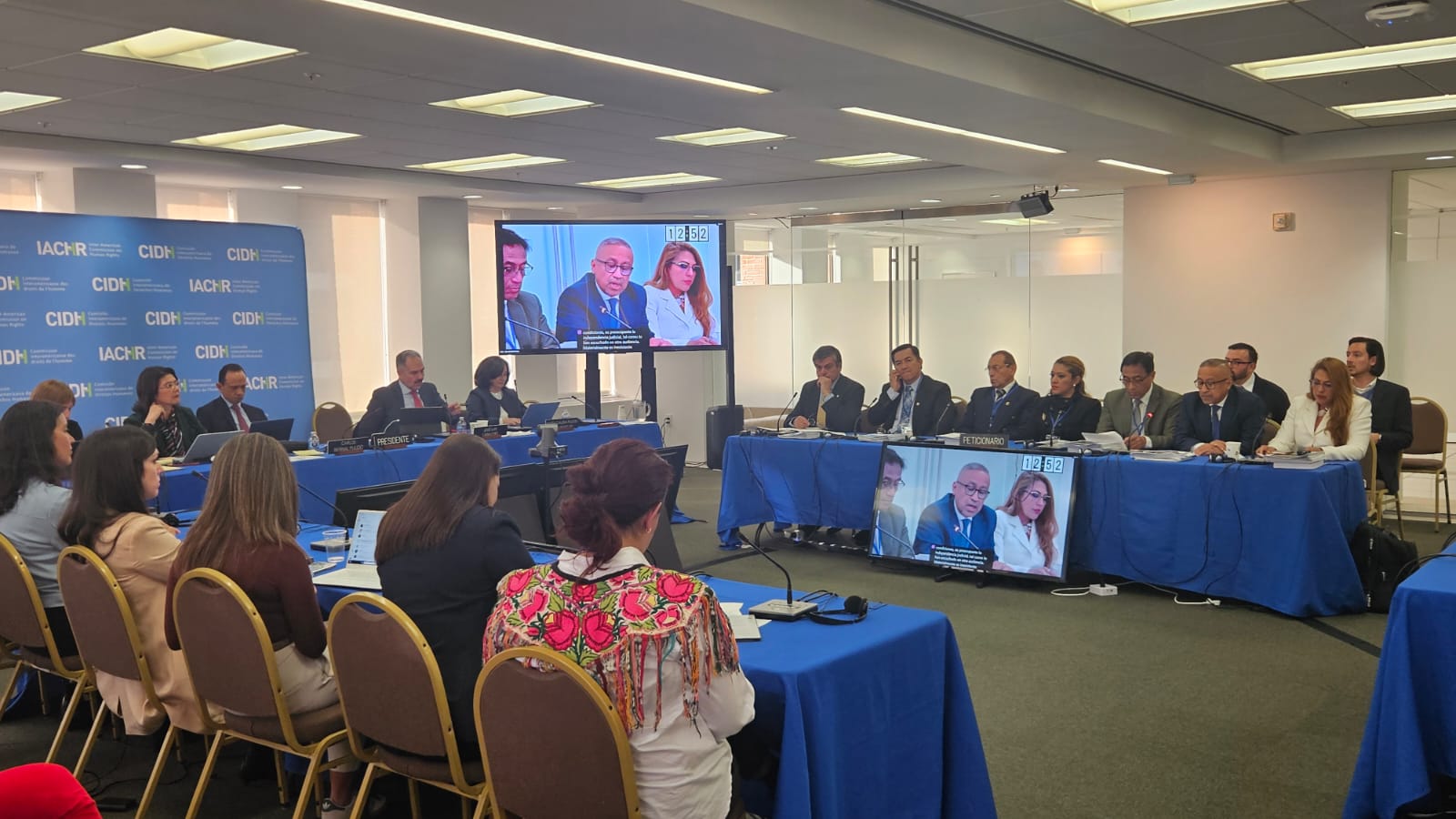
Representatives of judges’ associations present to IACHR commissioners during the hearing on judicial independence, November 13, 2024. Photo credit: Vance Center
Eight judges from seven countries (Argentina, Ecuador, Peru, Honduras, Guatemala, El Salvador and Costa Rica), including FLAM President Marcello Gallo and FECAJUD President Haroldo Vásquez, highlighted urgent challenges affecting judges’ job security, physical safety, and labor conditions, and called for the Commission to engage governments to address these issues. Their testimonies revealed a wide range of systemic issues undermining judicial independence and public trust in the rule of law. The judges also presented recently updated assessments of independence in the relevant national judiciaries, produced by the Vance Center, FECAJUD, and FLAM.
The speakers pointed to national and regional issues, including:
- The president of FLAM, Judge Marcelo Gallo Tagle of Argentina, denounced general threats to judicial independence in Latin America, citing job insecurity, budget cuts, and international political interference. He also addressed concerns in specific countries: looking at Bolivia, he criticized subjective evaluations and the suspension of judicial elections. In Chile, he highlighted excessive political influence in judicial appointments and called for governance reforms to ensure merit-based appointments and greater judicial transparency.
- Ecuadorian Judge Joseph Mendieta highlighted the critical challenges facing the country’s judiciary, including external attacks and internal corruption that undermine public trust and judicial independence. He pointed to systemic issues that overburden judges and disrupt legal processes, including inadequate infrastructure, outdated technology, and understaffing. Mendieta also emphasized the need for transparency, fair remuneration, and career advancement mechanisms to strengthen the judiciary and protect human rights.
- Judge Oswaldo Ordóñez, representative of Peru’s National Association of Magistrates, denounced actions by the parliamentary majority and government that have destabilized the justice system. They passed laws favoring political impunity, undermining judicial autonomy, and obstructing efforts against organized crime. These measures violated constitutional principles, eroded the separation of powers, and endangered democracy in the country.
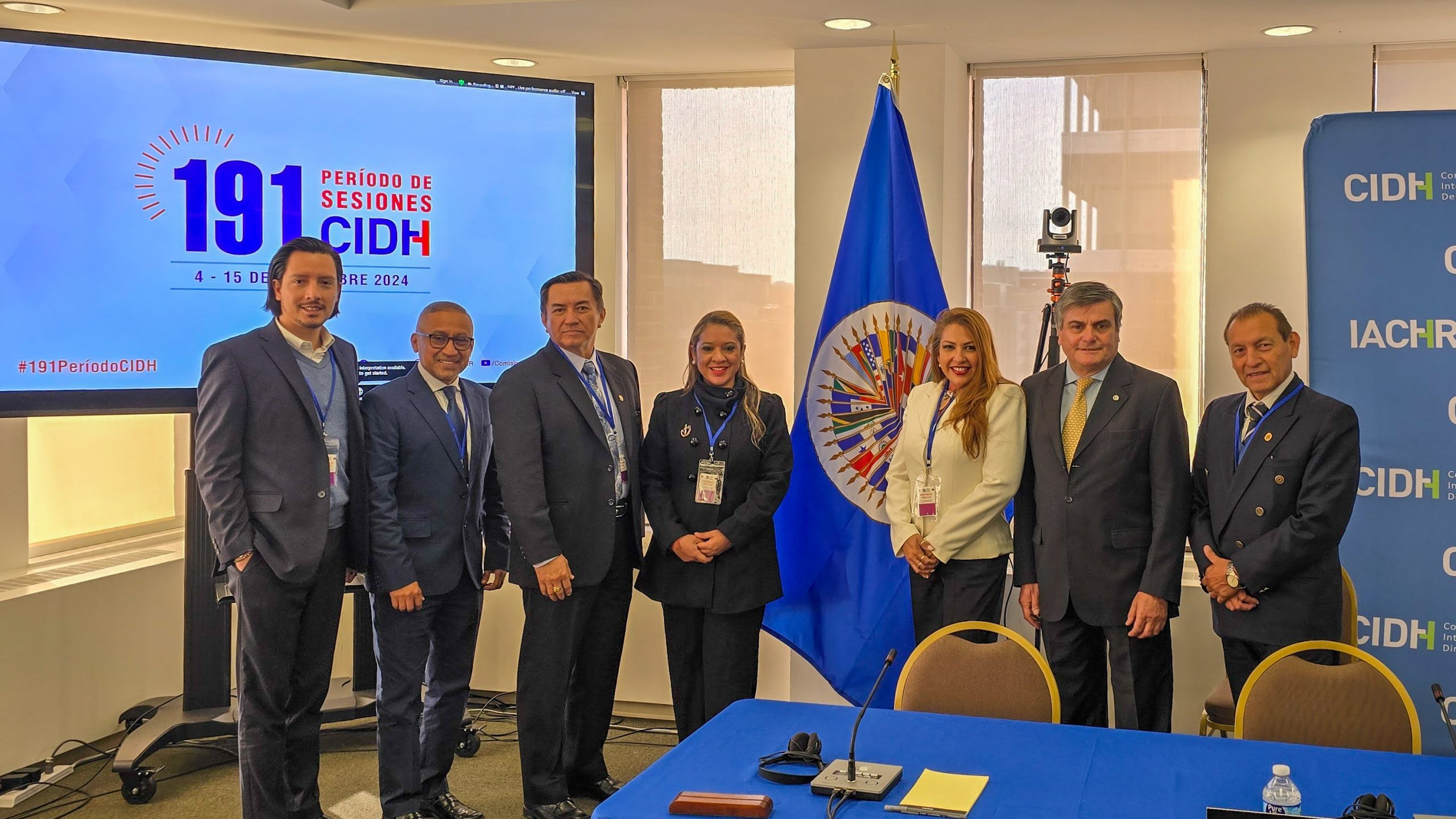
Representatives of the judicial associations at the IACHR hearing on judicial independence, November 13, 2024, Washington, DC. Photo credit: Vance Center
- Judge Ana Cardona, representative of the Association of Judges and Magistrates of Honduras, reported on dismissals and unjustified transfers of 17 judges under the current Supreme Court. She noted that these actions continued until recently, despite IACHR recommendations to stop, issued during an in loco visit from April 24 to 28, 2023. The IACHR’s preliminary observations from the visit highlighted the importance of safeguarding judicial independence and called for an end to practices that undermine it, including arbitrary dismissals and transfers. Cardona also recounted her own experience facing retaliation for advocating for judicial independence and job security for judges.
- Judge Haroldo Vásquez, president of FECAJUD, highlighted how corruption and judicial persecution have led to severe human rights violations and the erosion of democracy in Guatemala.
- Godofredo Salazar, a retired judge from El Salvador, highlighted the erosion of judicial independence following the removal and replacement of key judges in 2021, consolidating executive power. He noted that Salvadoran judges face threats, interference, and arbitrary dismissals, while come legal reforms have undermined impartiality and led to irregular appointments.
- Judge Adriana Orocú highlighted the threats posed by organized crime and drug trafficking to public security and democratic institutions in Costa Rica, emphasizing the need to respond by strengthening justice systems. However, recent laws have worsened conditions for the judiciary and the Public Prosecutor’s Office, resulting in pension cuts, salary stagnation, and severe budget restrictions, and leading to more than 1,000 resignations in three years. She stated that new laws have allowed judges to refuse human rights training and introduced measures undermining judicial stability, while official statements delegitimizing judicial decisions further erode public trust and threaten judicial independence.
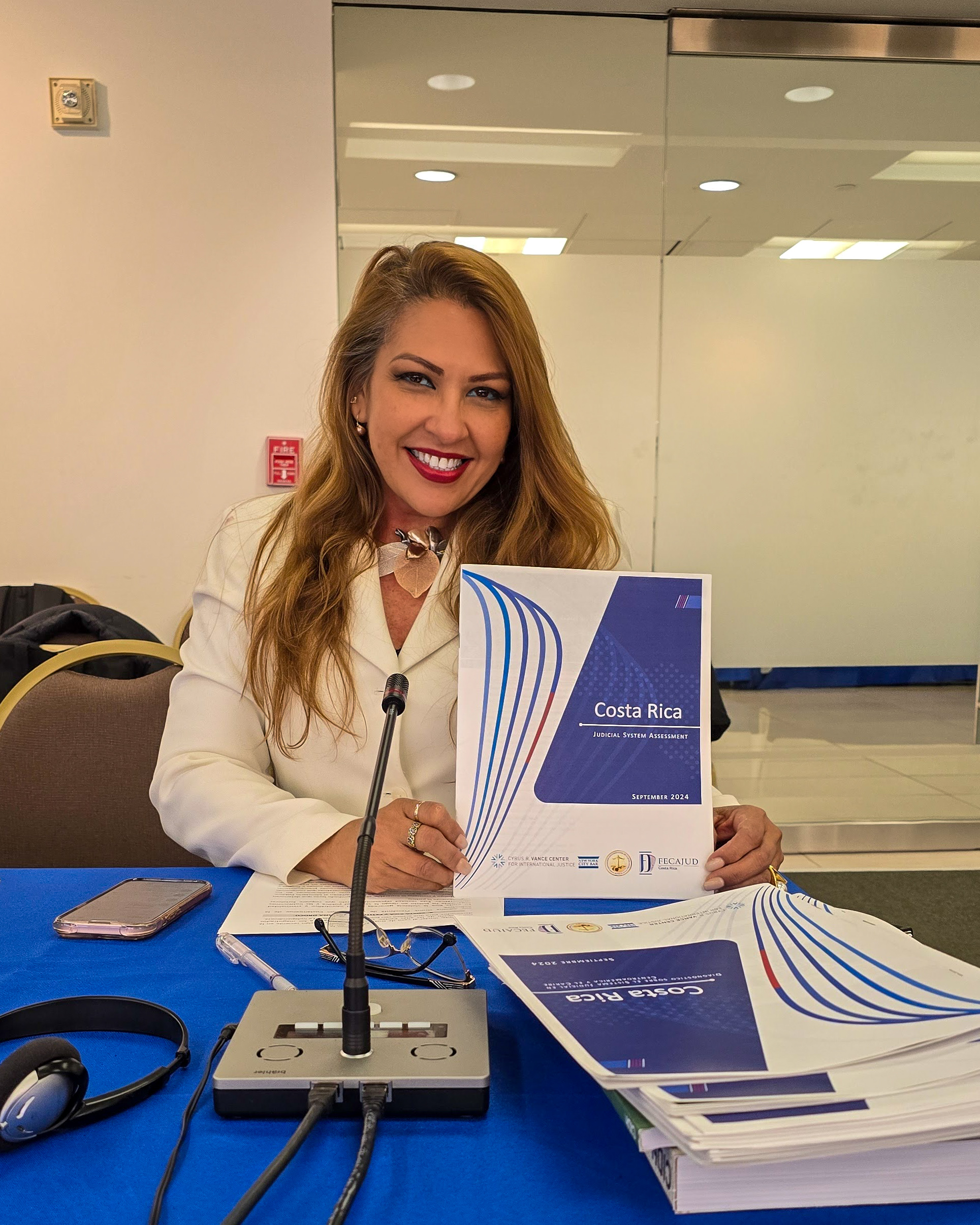
Judge Adriana Orocú holds the updated assessment of judicial independence in Costa Rica, November 13, 2024. Photo credit: Vance Center
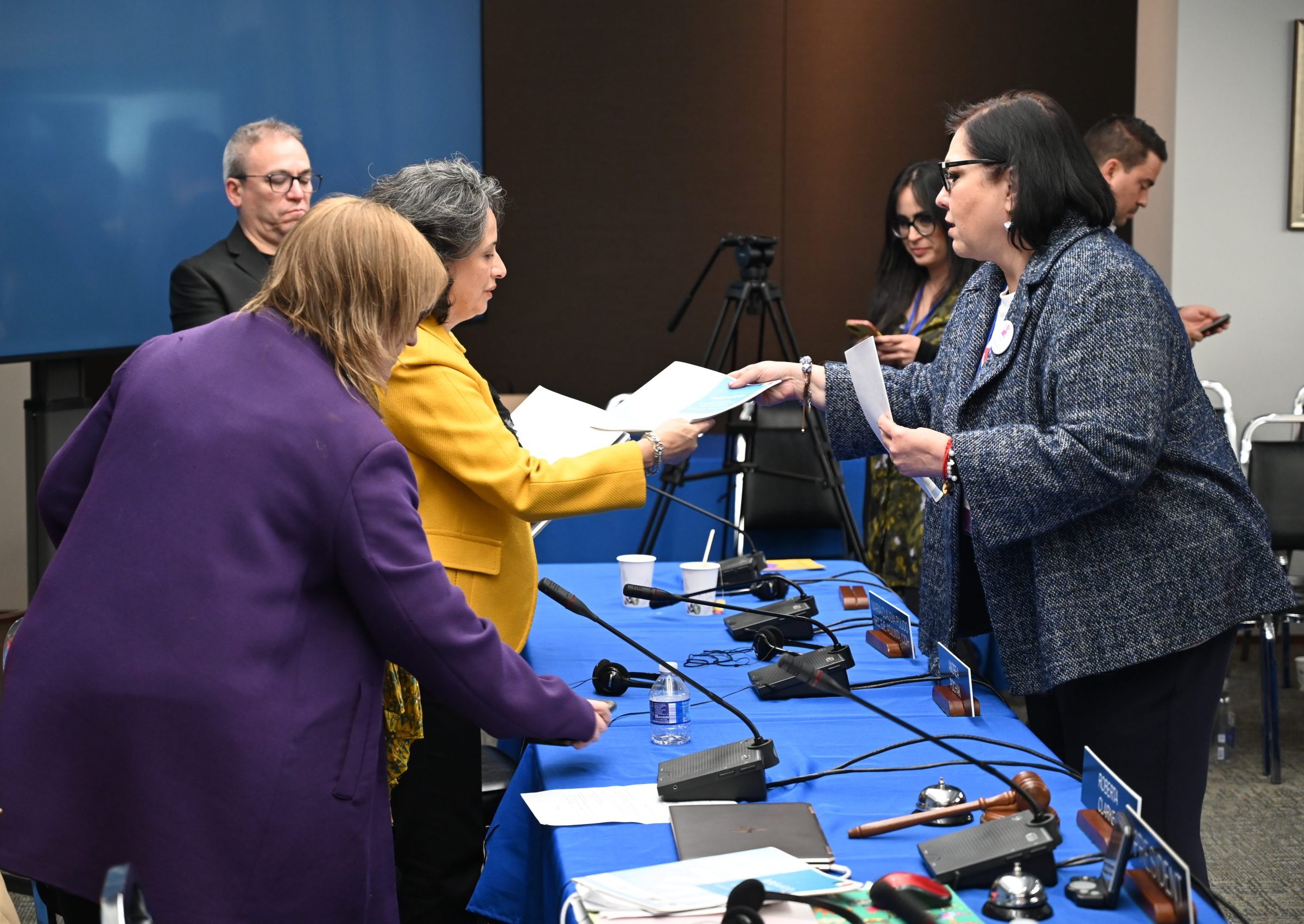
Sharing copies of the assessments of judicial independence in Latin American countries. Photo credit: Vance Center
The judges concluded their intervention with specific requests for the Commission, including creating a special rapporteur on judicial independence, issuing timely public statements addressing threats to judicial stability and safety, and expediting precautionary measure requests for justice operators facing criminalization or job insecurity. They also called for prioritizing cases related to judicial independence, reserving spaces during in loco visits to meet with judges from independent associations and including a dedicated section on judicial independence in country reports.
In response, IACHR Commissioners emphasized that judicial independence is a fundamental element of democratic institutions and that respect for judicial guarantees can only be achieved through independent and impartial courts. They highlighted the importance of this issue for the IACHR and noted the Commission’s ongoing monitoring efforts.
See the public hearing video and the assessment prepared with FLAM and FECAJUD.


